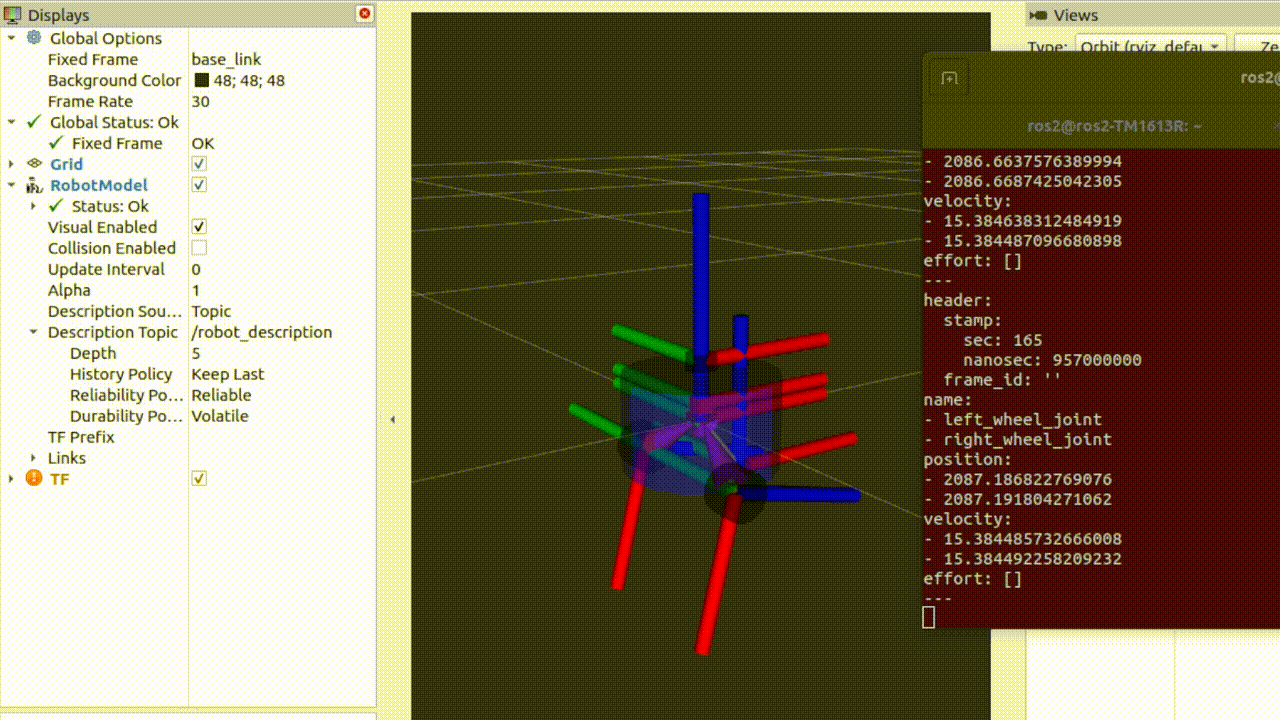8.4控制移动机器人轮子运动.md 6.1 KB
8.4 控制移动机器人轮子运动
我是小鱼,本节我们来看看如何手动的发送joint_states来控制机器人轮子连续转动
要实现上图效果,我们需要自己编写节点,取代joint_state_publisher发送关节位姿给robot_state_pubsher,robot_state_publisher发送tf控制机器人的关节转动。
1.新建节点
2.创建发布者
3.编写发布逻辑
4.编译测试
1.新建节点
方便起见,我们就在fishbot_describle包中新建节点(参考李四节点代码)
cd fishbot_ws
touch fishbot_description/fishbot_description/rotate_wheel.py
#!/usr/bin/env python3
import rclpy
from rclpy.node import Node
class RotateWheelNode(Node):
def __init__(self,name):
super().__init__(name)
self.get_logger().info("rotate node init.." % name)
def main(args=None):
"""
ros2运行该节点的入口函数
1. 导入库文件
2. 初始化客户端库
3. 新建节点
4. spin循环节点
5. 关闭客户端库
"""
rclpy.init(args=args) # 初始化rclpy
node = RotateWheelNode("rotate_fishbot_wheel") # 新建一个节点
rclpy.spin(node) # 保持节点运行,检测是否收到退出指令(Ctrl+C)
rclpy.shutdown() # 关闭rclpy
配置下setup.py
entry_points={
'console_scripts': [
"rotate_wheel= fishbot_description.rotate_wheel:main"
],
},
编译运行
colcon build
source install/setup.bash
ros2 run fishbot_description rotate_wheel
2.创建发布者
创建发布者之前,要知道robot_state_pubsher所订阅的话题类型是什么?
回忆前面章节中学习的内容,我们可以采用如下指令查看
ros2 topic info /joint_states
Type: sensor_msgs/msg/JointState
Publisher count: 1
Subscription count: 1
接着
ros2 interfaces show sensor_msgs/msg/JointState
# This is a message that holds data to describe the state of a set of torque controlled joints.
#
# The state of each joint (revolute or prismatic) is defined by:
# * the position of the joint (rad or m),
# * the velocity of the joint (rad/s or m/s) and
# * the effort that is applied in the joint (Nm or N).
#
# Each joint is uniquely identified by its name
# The header specifies the time at which the joint states were recorded. All the joint states
# in one message have to be recorded at the same time.
#
# This message consists of a multiple arrays, one for each part of the joint state.
# The goal is to make each of the fields optional. When e.g. your joints have no
# effort associated with them, you can leave the effort array empty.
#
# All arrays in this message should have the same size, or be empty.
# This is the only way to uniquely associate the joint name with the correct
# states.
std_msgs/Header header
string[] name
float64[] position
float64[] velocity
float64[] effort
知道了话题类型,我们就可以来创建发布者了参考代码4.2.1 话题通信实现(Python)
#!/usr/bin/env python3
import rclpy
from rclpy.node import Node
# 1.导入消息类型JointState
from sensor_msgs.msg import JointState
class RotateWheelNode(Node):
def __init__(self,name):
super().__init__(name)
self.get_logger().info(f"node {name} init..")
# 2.创建并初始化发布者成员属性pub_joint_states_
self.pub_joint_states_ = self.create_publisher(JointState,"joint_states", 10)
3.编写发布逻辑
创建好发布者,我们想让话题按照某个固定的速度进行发布,可以采用ROS2中的定时神器Rate,不清楚Rate的小伙伴可以看看小鱼的这篇文章:ROS中的定频神器你会用吗
为了能够一直循环使用rate,我们单独开一个线程用于发布joint_states话题数据
接着我们来构造发布的数据:
joint_states有一个头和四个数组需要赋值
std_msgs/Header header #时间戳信息
string[] name
float64[] position
float64[] velocity
float64[] effort
对应的含义为:
# 这是一个持有数据的信息,用于描述一组扭矩控制的关节的状态。
#
# 每个关节(渐进式或棱柱式)的状态由以下因素定义。
# #关节的位置(rad或m)。
# #关节的速度(弧度/秒或米/秒)和
# #在关节上施加的力(Nm或N)。
#
# 每个关节都由其名称来唯一标识
# 头部规定了记录关节状态的时间。所有的联合状态
# 必须是在同一时间记录的。
#
# 这个消息由多个数组组成,每个部分的联合状态都有一个数组。
# 目标是让每个字段都是可选的。例如,当你的关节没有
# 扭矩与它们相关,你可以让扭矩数组为空。
#
# 这个信息中的所有数组都应该有相同的大小,或者为空。
# 这是唯一能将关节名称与正确的
# 状态。
string[] name #关节名称数组
float64[] position #关节位置数组
float64[] velocity #关节速度数组
float64[] effort #扭矩数据
单个轮子的转速 = (当前的位置-上一时刻位置)/ 两个时间之间的间隔
所以最终有如下代码:
4.编译测试
编译程序
colcon build
此时运行关节数据发布节点
ros2 run
测试之前还需要修改下display_rviz2.launch.py文件,注释其joint_state_publisher节点
先运行rviz和robot_state_publisher
source install/setup.bash
ros2 launch fishbot_description display_rviz2.launch.py
观察此时rviz界面
技术交流&&问题求助:
- 微信公众号及交流群:鱼香ROS
- 小鱼微信:AiIotRobot
QQ交流群:139707339
版权保护:已加入“维权骑士”(rightknights.com)的版权保护计划


